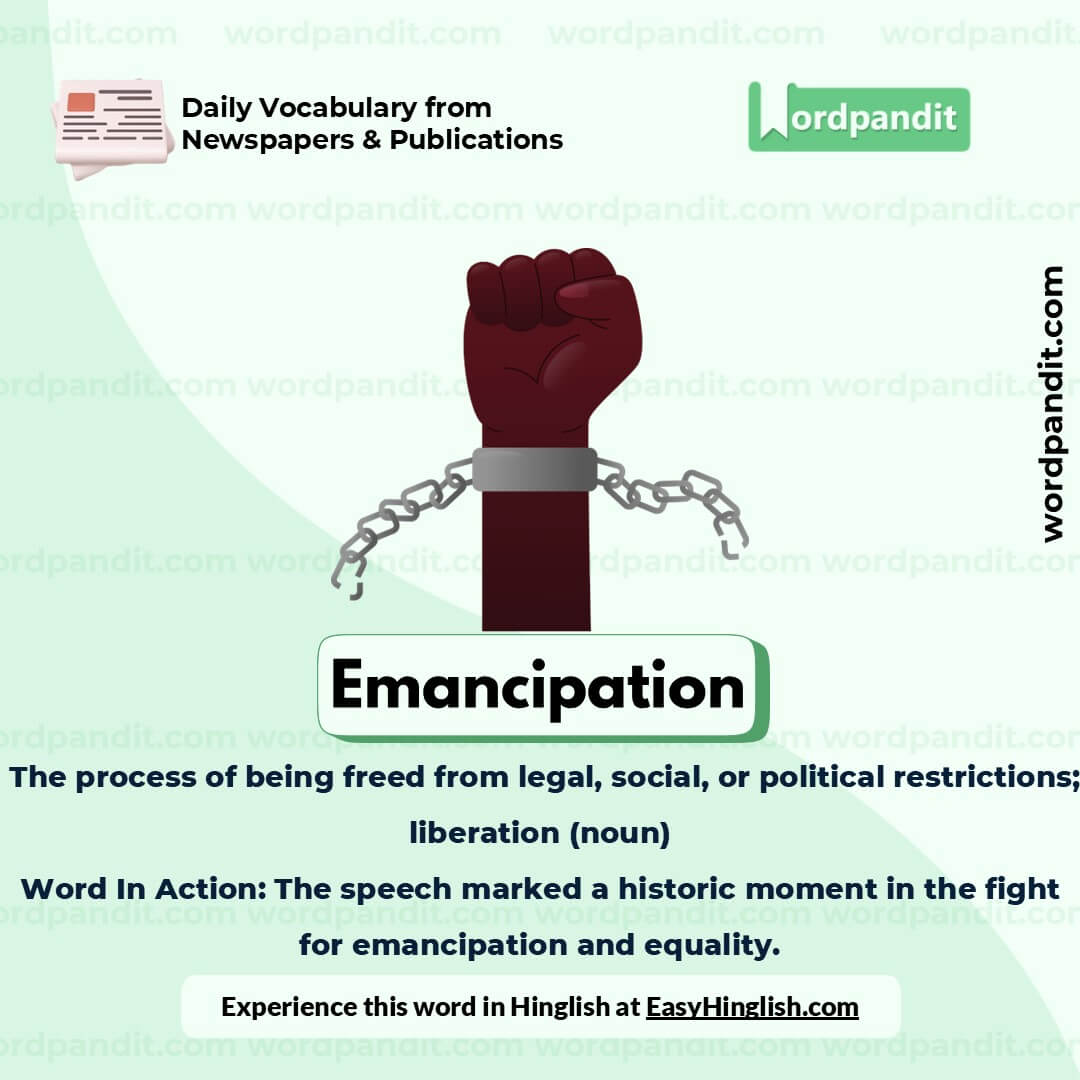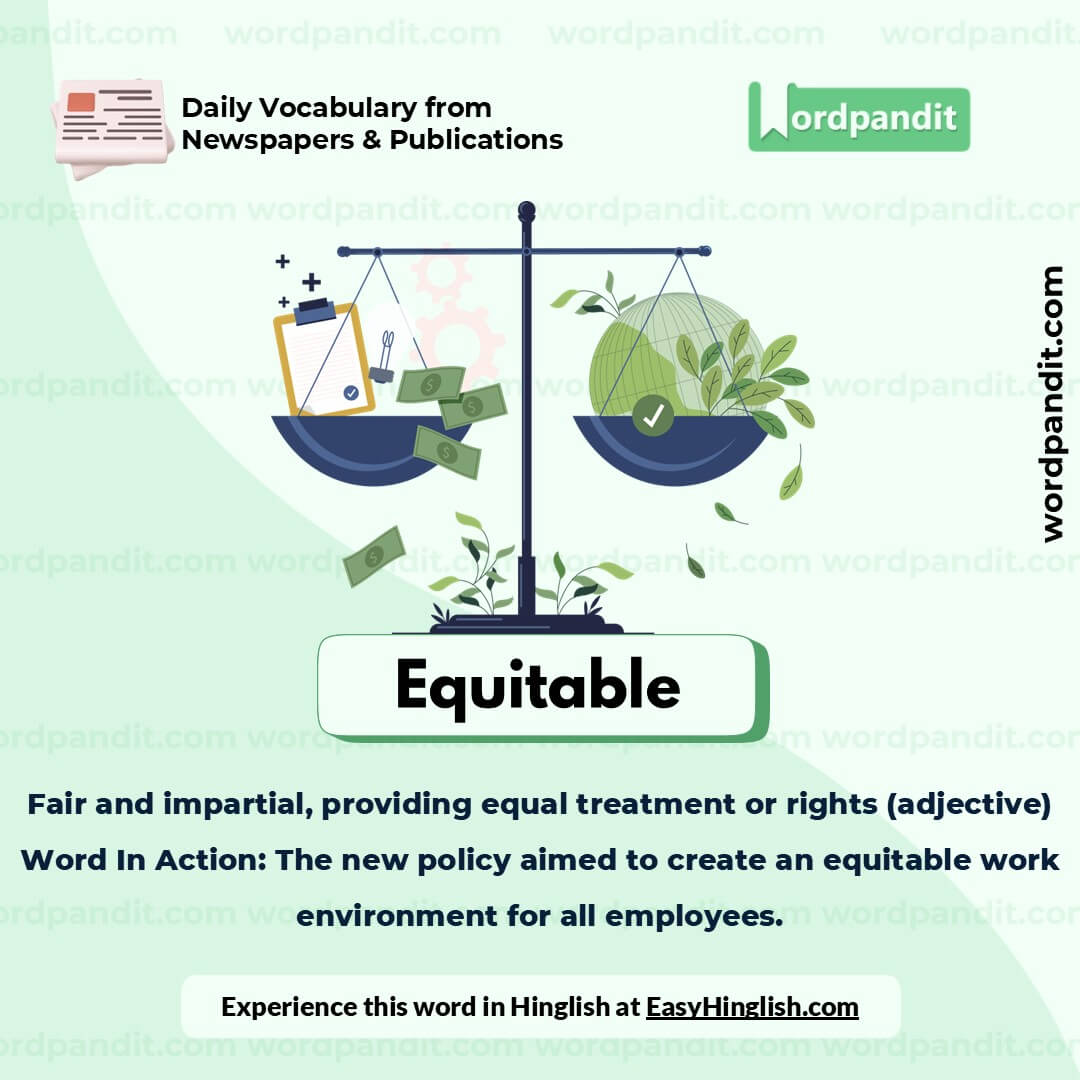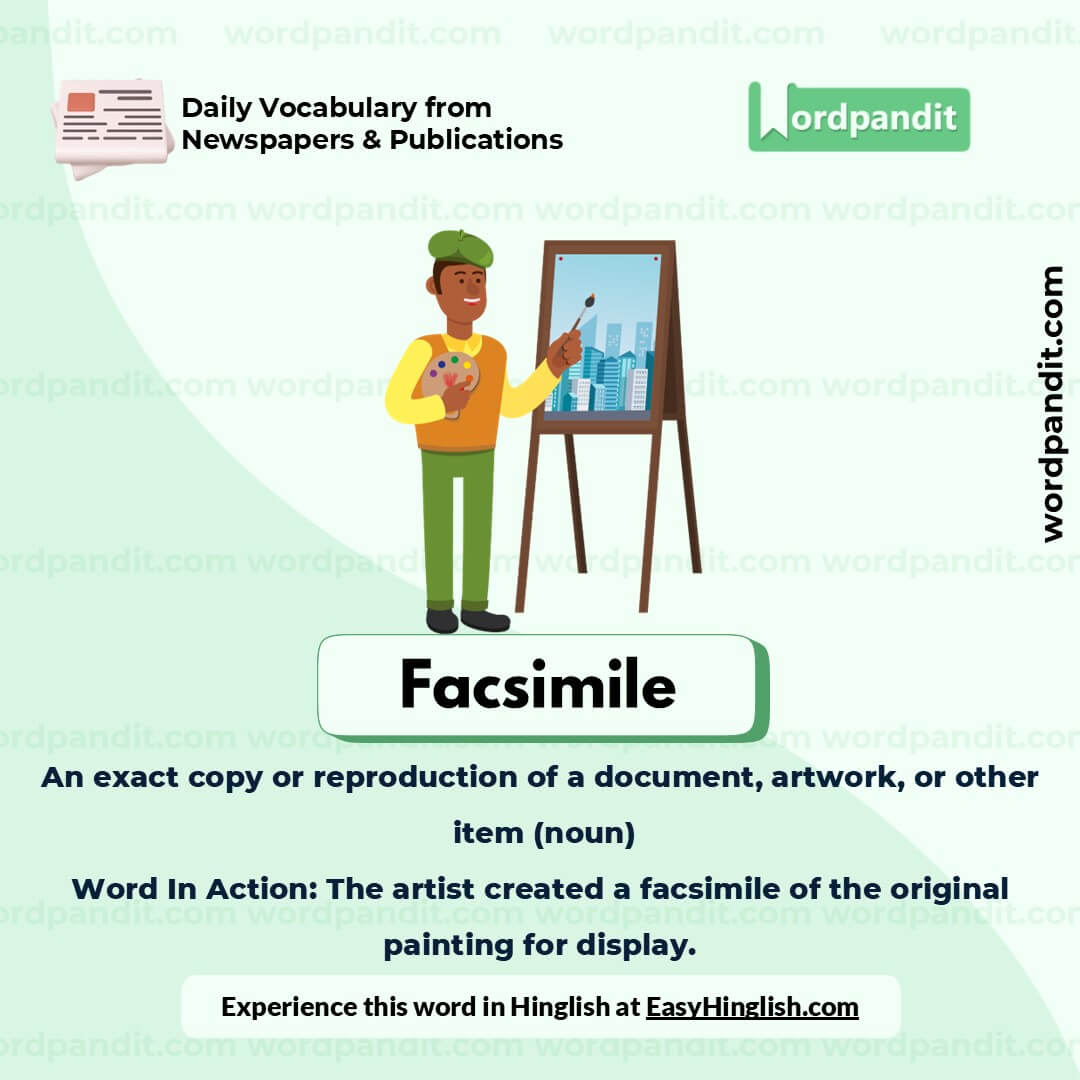Daily Vocabulary from International Newspapers and Publications
Expand Your Vocabulary with Wordpandit’s Global Vocabulary Hub
At Wordpandit, we are committed to helping you develop a truly global vocabulary by drawing from some of the most respected international publications. This section is designed to keep you ahead of the curve by introducing you to words that define global conversations and trends.
The Power of Global Sources
To help you think and communicate on a global scale, we curate vocabulary from renowned international sources, such as:
- The New York Times
- The Washington Post
- BBC
- The Guardian
- The Economist
- Scientific American
- Psychology Today
- And many more...
Stay Global, Stay Competitive
Our daily updates from international publications ensure you are consistently exposed to new words that reflect global news and developments, making sure your vocabulary is not only current but also globally relevant.
Enhance Your Global Perspective
Whether you’re preparing for international exams, aiming to excel in global business communication, or want to enhance your language skills for personal growth, Wordpandit offers the resources you need to thrive in a global context.
Effective Learning, Global Reach
Our learning methodology combines global examples, memory aids, and interactive activities, allowing you to internalize new words effectively and apply them in real-world scenarios.
Begin Your Global Vocabulary Journey Now!
Why Choose Wordpandit?
Practical Learning: Focus on words you'll actually encounter in real-world reading, enhancing your comprehension and communication skills.
Diverse Content: From current affairs to scientific breakthroughs, our varied sources expose you to vocabulary across multiple domains.
Effortless Integration: Make Wordpandit a part of your daily routine. Just a few minutes each day can significantly boost your lexicon over time.
Your Path to Vocabulary Mastery
- Visit our Daily Vocabulary section regularly
- Explore new words and their usage in context
- Practice incorporating these words into your own writing and speech
- Track your progress as your vocabulary expands
Start Your Journey Today
Embark on your vocabulary enhancement journey with Wordpandit. By consistently engaging with our daily posts, you'll build a robust vocabulary that serves you well in academic, professional, and personal contexts.
Remember, a word a day keeps linguistic limitations at bay. Make Wordpandit your daily companion in the quest for vocabulary excellence!
WORD-1: Emancipation
Context:
"How immigration and emancipation had transformed the country." - The Washington Post
Explanatory Paragraph:
Emancipation refers to the act of being set free from legal, social, or political restrictions. It often describes liberation from oppressive conditions, like slavery or tyranny, and represents a significant step towards achieving individual or collective freedom.
Meaning: The process of being freed from legal, social, or political restrictions; liberation (noun)
Pronunciation: ih-man-suh-PAY-shuhn
Difficulty Level: ⭐⭐⭐ (Intermediate)
Etymology: From Latin emancipare meaning "to free from control"
Synonyms & Antonyms:
Synonyms: liberation, release, freedom, enfranchisement, independence
Antonyms: subjugation, enslavement, oppression, captivity
Usage Examples:
- The Emancipation Proclamation was a pivotal moment in U.S. history, freeing enslaved people in the southern states.
- Advocates fought for the emancipation of women from traditional societal roles.
- The nation celebrated its emancipation from colonial rule with parades and fireworks.
- After years of struggle, the country achieved its emancipation and formed a new government.
Cultural Reference:
"Emancipation is not just the absence of bondage; it's the presence of freedom." - Dr. Martin Luther King Jr.
Think About It:
In what ways has emancipation shaped modern societies, and how can it still be relevant today?
Quick Activity:
Write a brief paragraph about a historic or modern-day event that represents a form of emancipation. What impact did it have on the people involved?
Memory Tip:
Think of the word "emancipation" as "escaping limitation" to recall its meaning of being freed from restrictions.
Real-World Application:
The concept of emancipation can apply to personal growth, social movements, and legal reforms, representing freedom from various forms of control or oppression.
WORD-2: Pivotal
Context:
"Most of the 1890 Census, a pivotal account of how immigration and emancipation had transformed the country." - The Washington Post
Explanatory Paragraph:
Pivotal describes something that is of crucial importance in determining the outcome of a situation or event. It indicates that a specific action, decision, or moment holds a key role in shaping future developments or influencing major changes.
Meaning: Of crucial importance in relation to the development or success of something (adjective)
Pronunciation: PIV-uh-tuhl
Difficulty Level: ⭐⭐⭐ (Intermediate)
Etymology: From the noun pivot, referring to the central point on which something turns, originating from French pivot in the 16th century
Synonyms & Antonyms:
Synonyms: critical, crucial, essential, central, decisive
Antonyms: insignificant, unimportant, trivial, minor
Usage Examples:
- The introduction of new technology was pivotal to the company’s success in the global market.
- Her decision to pursue a different career path proved to be a pivotal moment in her life.
- The pivotal role of education in shaping the future of young people cannot be overstated.
- Negotiations at this pivotal stage will determine the outcome of the peace talks.
Cultural Reference:
"The pivotal moment in the Civil Rights Movement came with the passing of the Civil Rights Act in 1964." - Historical accounts of the Civil Rights Movement
Think About It:
Can you think of a pivotal event in history that changed the course of a nation? How different would things be if that event had not occurred?
Quick Activity:
Identify a pivotal moment in your life and explain how it changed your perspective or actions.
Memory Tip:
Think of "pivotal" as "pivot point," meaning something that turns everything around or changes the direction of events.
Real-World Application:
In business and personal decision-making, recognizing pivotal moments can help in making informed choices that shape future success or direction.
WORD-3: Equitable
Context:
"To strengthen our nation’s democracy through equitable public access to high-value government records." - The Washington Post
Explanatory Paragraph:
Equitable refers to something that is fair and impartial, providing equal treatment or opportunities to all parties involved. It emphasizes justice and fairness, ensuring that everyone gets a fair share, especially in situations involving distribution or access.
Meaning: Fair and impartial, providing equal treatment or rights (adjective)
Pronunciation: EK-wi-tuh-buhl
Difficulty Level: ⭐⭐⭐ (Intermediate)
Etymology: From Latin aequitas meaning "fairness," related to aequus meaning "equal"
Synonyms & Antonyms:
Synonyms: fair, just, impartial, unbiased, even-handed
Antonyms: unfair, biased, unjust, inequitable, partial
Usage Examples:
- To create an equitable system, the school implemented a new policy ensuring all students had access to the same resources.
- There was a push for more equitable pay across different departments in the company.
- An equitable solution was reached after careful negotiation, satisfying both parties.
- The organization strives to offer equitable opportunities for people from all backgrounds.
Cultural Reference:
"In a truly equitable society, everyone has the same opportunities to succeed." - Discussions on social justice and fairness
Think About It:
How can societies balance the need for equitable treatment with individual differences in abilities and resources?
Quick Activity:
List three ways in which your community could promote more equitable access to education, healthcare, or public services.
Memory Tip:
Remember "equitable" by thinking of "equal treatment"—it’s all about fairness and impartiality for everyone.
Real-World Application:
Equitable practices are essential in areas like education, healthcare, and law, ensuring everyone has access to fair opportunities and resources, regardless of their background.
WORD-4: Schlep
Context:
"Residents of Anchorage or Boise still have to schlep to Seattle." - The Washington Post
Explanatory Paragraph:
Schlep is an informal word that means to drag or haul something, especially when it’s a burden or involves a long, tiring journey. It often implies inconvenience or a sense of reluctance about having to transport something or travel somewhere.
Meaning: To carry or haul something, often with difficulty, or to travel a long distance with effort (verb)
Pronunciation: shlep
Difficulty Level: ⭐⭐ (Intermediate)
Etymology: From Yiddish shlepn, meaning "to drag or pull," derived from Middle High German sleppen
Synonyms & Antonyms:
Synonyms: drag, lug, haul, trudge, trek
Antonyms: glide, cruise, coast, breeze, sail
Usage Examples:
- We had to schlep our heavy bags all the way to the train station.
- Every weekend, they schlep from the suburbs into the city for their favorite market.
- Instead of driving, we decided to schlep up the hill on foot.
- She didn’t want to schlep through the snow, but there was no other way to get home.
Cultural Reference:
"Schlep" is commonly used in New York City slang, influenced by the Yiddish-speaking Jewish community, and became popular in American English in the 20th century.
Think About It:
Why do you think certain words like "schlep" become part of everyday language, especially in big cities?
Quick Activity:
Think of a time when you had to "schlep" something or travel somewhere difficult. Write a short description of the experience.
Memory Tip:
To remember "schlep," think of dragging something heavy across a long distance—it’s the kind of tiring task that makes you want to sleep!
Real-World Application:
People often use "schlep" to describe not only physically difficult tasks but also metaphorically tiring activities, like a long commute or an unpleasant errand.
WORD-5: Facsimile
Context:
"The handy if banal digital facsimiles." - The Washington Post
Explanatory Paragraph:
Facsimile refers to an exact copy or reproduction of something, especially documents, art, or writing. In modern usage, it often applies to digital or mechanical copies, replicating the original in form but sometimes lacking its depth or uniqueness.
Meaning: An exact copy or reproduction of a document, artwork, or other item (noun)
Pronunciation: fak-SIM-uh-lee
Difficulty Level: ⭐⭐⭐ (Intermediate)
Etymology: From Latin fac simile meaning "make alike"
Synonyms & Antonyms:
Synonyms: copy, reproduction, duplicate, replica, likeness
Antonyms: original, prototype, unique, singular, authentic
Usage Examples:
- He provided a facsimile of the original manuscript for research purposes.
- The museum displayed a facsimile of the famous painting while the original was under restoration.
- The contract was sent as a facsimile via email for review.
- While the facsimile was impressive, it couldn’t capture the true beauty of the original artwork.
Cultural Reference:
"Facsimile" became widely known through the invention of the fax machine, which enabled sending copies of documents electronically before the digital age.
Think About It:
How do facsimiles, whether digital or physical, affect our perception of authenticity and value in art, literature, or history?
Quick Activity:
Identify a famous work of art or document and research if any facsimiles exist. What are the main differences between the facsimile and the original?
Memory Tip:
Remember "facsimile" by breaking it down: "fac" (make) and "simile" (similar), meaning to make something similar or identical to the original.
Real-World Application:
Facsimiles are essential in preserving important documents and artworks, allowing the public to access replicas while protecting the originals from damage or loss.
















